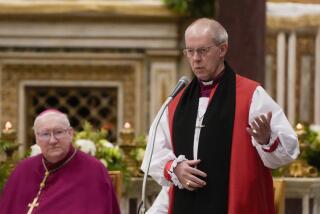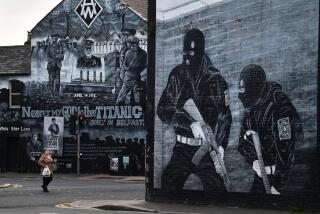Fund Courts Business and Criticism
- Share via
MONEYMORE, Northern Ireland — After decades of decline, the farming village of Moneymore is going back into business--the tourism business--with the help of a fund that tries to finance peace by spreading prosperity.
The International Fund for Ireland is paying half the $1.5 million bill for sprucing up the 18th-century Manor House as a 36-bed hostel, cafe and museum showing Moneymore’s development from a 17th-century Protestant “planter” village.
Moneymore used to be on Ulster’s agricultural and industrial crossroads, but today its High Street is a strip of ailing small shops, a Protestant Orange Order hall with broken windows, and curbstones painted the red, white and blue of the British flag. Derelict and its cream paint flaking, the Manor House stands as a monument to bygone glories.
“We’re optimistic this will bring some sense of prosperity back to the village, and some tourists,” said Kevin Johnston, vice principal of a Catholic school who planned the project with local Protestant businessmen.
The International Fund has become a $450-million investment since its creation in 1985. The United States has contributed the majority of that--$250 million--with the rest from the 15-nation European Union, Canada, Australia and New Zealand.
Northern Ireland is dotted with International Fund projects, notably in Catholic areas: community centers, businesses, museums, tidied-up storefronts, even a butterfly park.
Although Protestants complain the fund discriminates, proponents of the foreign aid argue that creating opportunities--particularly in Catholic areas where unemployment runs highest--is essential to buttress peace.
“People become antagonistic when they’re fighting over limited resources like jobs,” Johnston said. “With enough jobs and prosperity to go around, there’d be no depth to the animosity that has spoiled Northern Ireland in the past.”
*
President Clinton had pledged to raise U.S. contributions to the fund from $19.6 million to $29.6 million a year, but he was overruled by congressional budget-cutters.
“We have a very large list of projects, and a long pipeline of commitments. The extra $10 million would have been useful but we understand that budgetary times are tough,” said William McCarter, chairman of the fund.
Clinton highlighted the role of the fund as “an engine for development and reconciliation” during his tour of Northern Ireland in November.
An audit by KPMG Peat Marwick, commissioned by the fund and released last month, said the program could share credit for underwriting more than 16,000 jobs, not including construction work, since 1987. Without those jobs, Northern Ireland’s unemployment rate of 11.5% would be about 2 points higher.
The fund was created as part of the Anglo-Irish Agreement of 1985. Protestant leaders bitterly opposed that treaty because it gave the Irish government a say in Northern Ireland policies.
*
The Ulster Unionists, Northern Ireland’s largest party, published a study claiming the fund has promoted Catholic fortunes at the expense of their Protestant turf.
Economists say it’s not surprising that the emphasis is on Catholic areas.
“The fund was set up to target disadvantaged areas of Northern Ireland. These . . . tend to be [Catholic] nationalist,” said Ronnie Scott, chief analyst for the independent Northern Ireland Economic Research Center in Belfast.
Scott said the fund made its biggest contribution in supporting high-risk projects, including a plant that makes circuits for computer semiconductors in west Belfast that employs about 30 but plans to expand to 400.
Project Moneymore joins more than 3,000 projects started since the United States became the fund’s primary donor nine years ago.
When it was launched Nov. 13, many Moneymore residents were surprised by the presence of the Rev. Willie McCrea, their local representative in the British Parliament.
McCrea, a member of the Democratic Unionist Party, also belongs to the Apprentice Boys, a sternly pro-British fraternal order that rejected International Fund help for a museum project five years ago.
McCrea repeated his position that the fund grants represent “blood money,” but said: “If America wants to pour money into the place I suppose we shouldn’t turn our nose up. . . . I say, milk the cow.”
More to Read
Sign up for Essential California
The most important California stories and recommendations in your inbox every morning.
You may occasionally receive promotional content from the Los Angeles Times.













